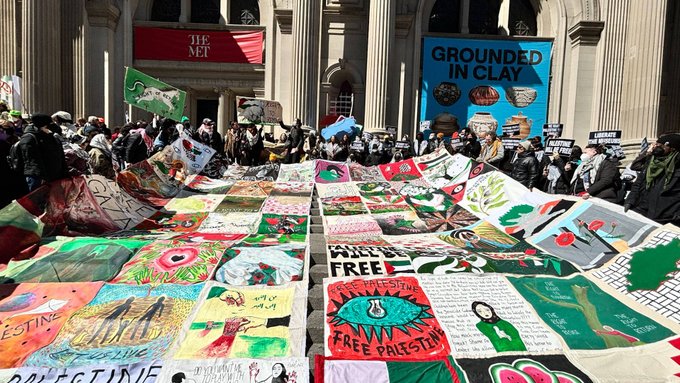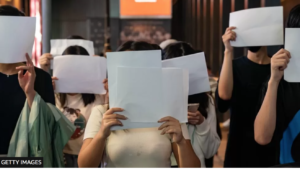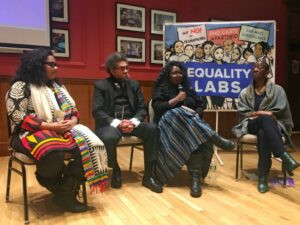It was the middle of the work day, and yet a completely full cargo ship stood next to an Indian port and workers were nowhere to be seen. On 14 February 2024, the Water Transport Workers Federation of India, which represents 3500 workers in 11 ports, announced their refusal to load or unload any weaponized cargoes intended for use in Israel’s continuing genocide in Gaza. Soon afterwards, as Israel began to revoke work permits for Palestinian workers and declared their intent to import Indian workers to replace them, India’s Central Trade Union Organizations, representing more than 100 million workers, strongly condemned these talks and pronounced that they would not be a part of “complicity on India’s part with Israel’s ongoing genocidal war against Palestinians”.
Workers rising up in India is not an isolated event; around the entire world, people from all backgrounds and sectors are building people power to demand a permanent ceasefire and an end to the occupation of Palestine. Direct action and decentralization are emerging as two strong strategies that are putting pressure on governments, companies and institutions directly or indirectly enabling Israel’s ongoing genocidal war.
DIRECT ACTION AS STRATEGY
Many groups do not have the same numbers as India’s Central Trade Union Organizations, but there are new and old groups that understand the tangible and immediate impact of direct action in this conflict. Direct action is a strategy that aims to directly disrupt power imbalances and its tactics can include boycotts, strikes, sit-ins, blockades, demonstrations, and more.
While many Western governments are still providing Israel with military aid and weapons, direct action as a strategy shows that people can be in direct opposition to their governments and have the power to influence, and ultimately change government policy or economic trends by disrupting normal life and the economy.
For example, a sustained Palestine Action campaign against a Tamworth factory has seen it taken over by new owners who have cut all ties with Elbit Systems and the arms trade to Israel. Palestine Action is a direct action organization with chapters in the UK, US, and France who have been running #ShutElbitDown, a campaign against Elbit, an arms manufacturer that is supplying weapons to Israel. They have been carrying out direct actions against Elbit factories and offices throughout the US and UK, reducing their profitability by up to 75%, therefore forcing the closure of a few of these factories and directly reducing the arms supply to Israel.
There is a mainstream media-propagated image of direct action tactics as always being aggressive, damaging, or desperate: images of people being chained to bulldozers or throwing buckets of red paint at factories come to mind. But direct action tactics can be as diverse and creative as the wide expanse of the human mind, and artists are often the ones imagining new ways to convey or communicate a message.
In front of the British Museum, dozens of artists gathered with hand-painted signs, paintings, and colorful clothing. They entered the building and immediately sat down, taking up physical space, with curious onlookers around. Just recently, the British Museum had announced its new 10-year sponsorship deal with BP, which is profiting from fossil fuel extraction and the conflict in Gaza. A diverse and wide network of culture workers and artists, they coordinated and participated in a larger movement called Energy Embargo for Palestine against two of London’s major museums in May. These were diverse groups present; climate justice movements, Palestine solidarity groups, human rights groups, parents, scientists and young people were also present.
Something similar to a sit-in, demonstrators and artists took to the steps of the Metropolitan Museum of Art in New York City unfurling an enormous (30 x 50 foot) quilt created by artists around the world in solidarity with Palestine. The quilt was collectively created by 64 artists from around the world and shipped to New York City.
Notably present in participating in many direct action events have been Jewish activists and organizations; they have put their bodies first and leant their identities to combatting the dangerous claim that criticizing an ongoing genocide in Palestine is antisemitic. Jewish Voice for Peace has been leading protests and sit-ins across the United States and also providing valuable narrative strategy to activists whose actions are being attacked as anti-Semitic.
Perhaps the most known for popularizing direct action as a major and effective strategy, the Boycott, Divestment, and Sanctions (BDS) Movement has been strongly advocating these three types of direct action tactics ever since its launch in 2005. Led by Palestinian activists, they have explained to a global audience why direct action is such an effective strategy: “BDS aims to end international support for Israeli violations of international law by forcing companies, institutions and governments to change their policies. As Israeli companies and institutions become isolated, Israel will find it more difficult to oppress Palestinians.”
BDS has made significant headway in championing an economic and cultural boycott of Israeli companies and cultural institutions. They are leading a campaign to ban Israel from international sports and the Eurovision song contest.
Boycotts have become a direct action tactic that has had significant economic impact, which is felt long after mass protests end. But while BDS may have originally championed boycotts as a strong tactic, it has certainly become decentralized. The current boycott around the world against McDonald’s, Burger King, Pizza Hut, Papa John’s and other companies is coming from organic grassroots campaigns, not initiated by the BDS movement. Workers are also enforcing boycotts by pressuring their companies to adhere to them, such as NHS workers in the UK campaigning to end the NHS’s contract with a company linked to the Israeli military. Trade unions have also been particularly pushing an arms embargo; Houthi pirates in Yemen have implemented this through their own tactic of directly attacking any cargo ships heading to Israel.
DECENTRALIZATION AND GRASSROOTS MOVEMENT BUILDING
It has taken many decades to get to this current moment of significant movement growth in solidarity with Palestine. Given the scale of the genocide, urgency in the response for a permanent ceasefire and end to the occupation of Palestine has also multiplied and grown outside of traditional institutional response.
Decentralization as a phenomenon grows from sites of protest and centralized, albeit, temporary spaces. And in fact, one of the strongest indicators of decentralization of solidarity strategies and tactics have been the widespread and well-attended demonstrations in solidarity with the Palestinian people in nearly every city across the globe since October 2023. People meeting each other weekly or monthly in different cities have already taken the first step into getting involved civically, and from these protests, they are joining different coalitions, grassroots movements, and collectives calling for an end to the genocide. Meeting each other first in protests, a Telegram channel called Palestine is Everywhere called for New York City residents to design and create their own autonomous actions from March 27-30th.
Coinciding with the rise of workplace organizing and unionizing in general, workers are also pressuring their companies and organizing their workplace to show solidarity with Palestine. More than 600 workers at Google demanded that their company cut ties with an Israeli conference, and Muslims, Palestinians, Arab, and anti-Zionist Jewish workers at the company have criticized their repression of pro-Palestine sentiment. But perhaps more commonly, there are cross-workplace workers from the same sector who are mobilizing their sector specifically to talk about Palestine, such as Publishers for Palestine, Workers for a Free Palestine, Health Workers for a Free Palestine, the Anti-Fascist Art Techno and Music Alliance in Berlin, and more.
In stark contrast, many mission-based non-profits and charities have remained silent on the genocide in Palestine. But workers in social justice organizations are also demanding that solidarity with Palestine also be reflected in their programming and external communications. In this way, some organizations have also begun to make the connection between the ongoing occupation in Palestine and their missions, connecting issues such as the climate crisis and the occupation of Palestine, for example. Fossil Fuel Non-Proliferation Treaty Initiative is an initiative calling for a global mechanism to phase out fossil fuels fast and fairly, and is demanding that the world not turn away from Palestine.
Artists and art production have also always characterized decentralization. Dozens, if not hundreds, of informal artist collectives and movements have sprung up around the world creating art and weaving messages that echo the call for a free Palestine and permanent ceasefire. In the context of powerful media institutions ignoring the gravity of the situation in Palestine, people have returned to taking their art to the streets where they are not as affected by repression of speech – for example, wheatpasting has made a big comeback. Arab musicians and activists created songs in solidarity with Palestine, expressing their grief and anger about the ongoing genocide.
People from all corners of the world are being invited to learn about and mobilize for Palestine, which is a historical turning point and significant narrative change in the long struggle to end apartheid and occupation in this region. Campaigning for government policy change can only go so far when powerful interests are vested and weapons companies are profiting from genocide; this is a moment where a return to direct action and grassroots organizing is having much more impact. Palestine is a litmus test for humanity, and an open invitation for all of us who claim to care about human rights and social justice: how are we getting involved and organized to end this genocide today? Somdeep Sen writes in an article about censorship against Palestine: “It is our collective responsibility to insert “Palestine” and “Palestinians” everywhere – every article, every artwork, every discussion. Our only chance of stopping this genocide is to learn from history, and continue speaking about Palestine.”
WHAT WE ARE READING:
- ReproJobs is sunsetting after a decade of organizing reproductive justice workers and organizations. Their impact has been monumental: they created real space and resources for labor organizing within reproductive justice, called about institutional racism within the reproductive justice sector, set up the Repro Justice Worker Aid Fund, created a crowdsourced salary database, and helped facilitate the creation of more than 50 unions. [ReproJobs]
- Important read on organizing, strategy and solidarity and the limitations of our current approaches to fighting for social justice. “Scholars have since documented the way the late 20th century was, for the activist left, characterized by a shift to a shallow, professional and often philanthropically funded model of “advocacy”, one that elevates self-appointed leaders and elite experts to speak on behalf of constituencies to whom they are not directly accountable. Rather than organizing people to fight for themselves, these groups promote professionals who attempt to exert influence inside the halls of power. Instead of protests, they publish white papers; in place of strikes, they circulate statements; instead of cultivating solidarity, they seek access to decision-makers. These kinds of elite strategies can occasionally produce positive results, but the approach is often counterproductive, and certainly not democratic. This top-down approach puts its faith in the persuasive abilities of a tiny few, and denies the fact that politics is a power struggle – and that engaging and organizing more people gives your position more leverage.” [The Guardian].
- Feminist NGO Purposeful’s journey to decolonise its pay scales offers useful insights for those interested in applying a feminist lens to salary structures. “The best option for us in terms of decolonising our payscale was paying people based on the role they have, rather than where they are based or their passport.” [Purposeful]
- These changes are made by many folks acting on the same cause from 1000s of angles over decades – in other words through movements. In order to work out how best to contribute to the strength of your own movement, you need to understand it. This is a step by step guide to identify and map your movement, with suggestions to help your group or organization work out where you’re best placed to strengthen the whole. [Thinking Doing Changing]
- Decolonization means the humanitarian sector must amplify Palestinian narratives, highlighting the ways in which Palestinians have endured decades-long occupation and oppression. Humanitarians’ influence must be leveraged for long-term justice for Palestinians. Anything less will perpetuate the sector’s role as an ineffectual bandage to a 75-year-old wound. [ODI]
OPPORTUNITIES
- Last places left for our Berlin Campaign Accelerator training (15-19 April). You can still join a wonderful group of campaigners and explore the art and science of designing transformative people-powered campaigns. Subsidized spots are available. Apply here. Recently, we just concluded the London Campaign Accelerator training and participant Yara Moussa from World Animal Protection wrote about her experience.
- Free Introduction to #CommunityOrganising workshop – all welcome! Come connect, experience an Act Build Change training space & learn tools to help you build power with your community. On zoom 2-4PM Wed 17 April.
Jobs
Looking to create change (or make a change)? Scan these open roles in campaigning, digital innovation and social change leadership. Have a job to share? Reply directly to this email with a link to the job that you’d like us to share in the next Dispatch. Note: we will only share jobs that have transparent salary ranges. This is essential for ethical recruitment. #ShowTheSalary and #BanUnpaidInternships
- Ceasefire Now Campaign Coordinator – Crisis Action – Open until filled. [Beirut, Hybrid]
- Monitoring, Evaluation, Accountability and Learning Officer – Medical Aid for Palestinians – Apply by 8 April [Gaza]
- Movement Medicine Programme Lead, Healing Justice London, apply by 15 April. [London]
- Radical Archivist, Healing Justice London, Apply by 15 April. [London]
- Senior Community Organiser – Act Build Change – Apply by 18 April. [Remote/London]
- Collective Care Trainer – Act Build Change – Apply by 18 April. [Remote/London]
- Director of Strategic Communications – The Global Fund for a New Economy – Apply by 10 May. [Remote, Global]
- Program Manager – Sovereign Tech Fund – Open until filled [Berlin or remote].
- Press and Communications Lead – Hope Not Hate – Apply by 25 April. [London, hybrid]
- Senior Campaign Researcher – Centre for Progressive Change – Open until filled. [London or remote UK based]
- Brazil Senior Campaign Coordinator – 350.org – Open until filled. [Brazil, remote with a preference for the Amazon region]
- Senior Global Campaigns Manager – Our Kids’ Climate – Apply by 15 April. [Remote]
- Head of Campaigning and Organizing – 350.org – Apply by 8 April [Remote]
- Head of Regions – 350.org – Apply by 8 April [Remote]
- Corporate Accountability Campaigner – Friends of the Earth – Apply by 19 April [Brussels]
- Programme Manager Europe (CEE) – Porticus – Open until filled [Vienna, Austria or Brussels, Belgium]
- Multiple roles – We Move Europe – Open until filled. [Remote, Europe]




